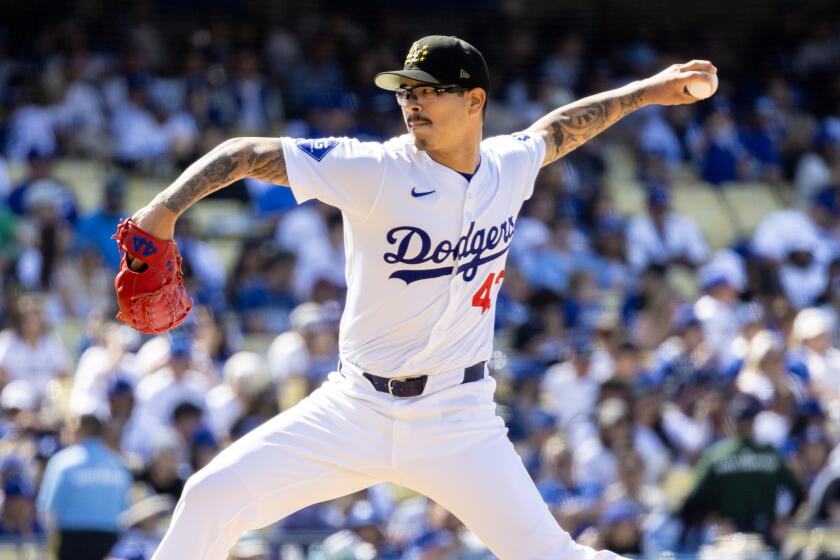The Bonds man
After 33 years of living on the wrong side of history, you would think Al Downing would have sympathy for Barry Bonds’ upcoming victim, not the slugger.
Sometime soon Bonds will hit his 756th home run, and Downing no longer will be the pitcher who surrendered the homer that set the record. Downing has had that tag attached to his name since April 8, 1974, when he was pitching for the Dodgers and gave up the home run that moved Hank Aaron past Babe Ruth. It’s usually the first thing people ask about when he makes appearances for the Dodgers’ speakers bureau.
That doesn’t mean he’s ready to provide words of comfort for the pitcher who will take his place. If anything, he feels sorry for Bonds.
“People are saying, ‘Are you going to call the guy that gives up the home run?’ ” Downing said. “Why? You should be focusing on the hitter. To keep harping on people who give up home runs makes no sense.”
Here’s what else doesn’t make sense to Downing: the condemnation of Bonds and Commissioner Bud Selig’s reluctance to be a part of the historic moment. Aaron has said he won’t be there, and Selig has been noncommittal.
“Henry Aaron’s a grown man; he should do whatever he wants,” Downing said. “Bud Selig represents Major League Baseball. Bud Selig should be there. This is a monumental moment in the history of Major League Baseball.”
Selig’s hedging, dodging and delaying is a statement in and of itself. It says he’s in the large crowd that believes Bonds’ numbers are tainted by the use of performance-enhancing drugs.
“I think it’s a disgrace that people go to such means to condemn a guy for something that they have no proof that’s ever occurred,” Downing said. “It seems like they’re trying to distract him from trying to break the record. People are hoping he retires before breaking the record. What kind of attitude is that?
“Nobody was standing at home plate giving him special guidance. You have to take your hat off to a guy, to say this is a tough accomplishment.”
But shouldn’t we look at any accomplishment in the last 10 years with a skeptical eye? Doesn’t the Mark McGwire-Sammy Sosa Home Run Race of ’98 -- and every home run milestone since then -- look increasingly tainted with every scandalous book, congressional hearing or federal raid?
“First of all, the people who have been bellyaching about these numbers, they start off by saying the pitching’s watered down,” Downing said. “Then they say the ballparks are smaller. Then they say these guys have [chemical] help hitting these home runs. If all the previous things are true, they didn’t need help.”
Downing also says that since his career ended in 1977 the pitchers have not refined their skills as much as the hitters have. Hitters are better at recognizing pitches; pitchers are less deceptive and more reliant on trying to overpower batters.
It doesn’t upset Downing when Bonds hits a home run. It bothers him when teams decide to walk him without even trying to get him out.
“The travesty of the whole thing is we don’t get to see the best of him because they walk him so much,” Downing said. “They don’t let the guy swing the bat. They ought to give the fans the money back when they do something like that. People come to see this guy play. Nobody wants to go to a three-game series and see Barry walk 12 times.
“I didn’t come up in an era when you walked guys. I came up in an era where you tried to get guys out.”
Downing’s career started with the New York Yankees in 1961, when Roger Maris and Mickey Mantle were chasing Ruth’s single-season record of 60 home runs. His playing career saw the integration movement take hold in the 1960s, the transition to nighttime World Series games, a brief stint with Charlie Finley’s colorful Oakland A’s of the early 1970s, and the stability that was the Dodgers with Manager Walter Alston and the Steve Garvey-Davey Lopes-Bill Russell-Ron Cey infield.
That’s why he hasn’t spent his life moping about the pitch he threw to Aaron. At least he was in a major league uniform when he made the windup and the delivery.
“I don’t look upon it as a negative moment,” Downing said. “I look on it as being a part of history in baseball. Do I wish I had gotten a ground ball and a double play? Of course.
“It was a fastball that didn’t get down. Hank Aaron was a great hitter. He didn’t have to get a good pitch to hit it out of the ballpark.”
Reluctantly, he acknowledges the reason we feel compelled to attach a pitcher to every great hitting moment.
“For every hero, there has to be a villain,” Downing said.
Only this time around, it looks as if the villain is the one holding the bat.
*
J.A. Adande can be reached at j.a.adande@latimes.com. To read more by Adande, go to latimes.com/adande.
More to Read
Are you a true-blue fan?
Get our Dodgers Dugout newsletter for insights, news and much more.
You may occasionally receive promotional content from the Los Angeles Times.










